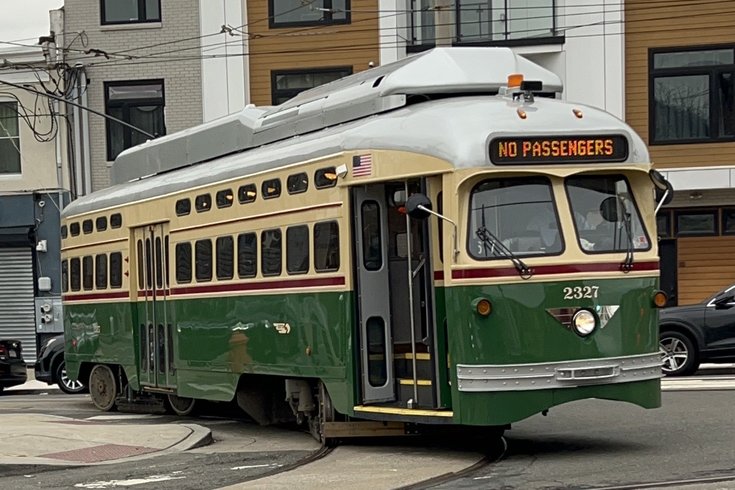
February 13, 2024
 Chris Compendio/PhillyVoice
Chris Compendio/PhillyVoice
Green and cream-colored PCC streetcars are still in the testing phase, with SEPTA aiming for 200 hours of "break-in time" for each trolley car before their full service resumes on the Route 15 line.
SEPTA's green-and-cream retro trolleys have been spotted back on the tracks in the city, but they won't be ready for passengers until at least this coming spring.
SEPTA expects eight of the classic PCC trolleys to return within the next few months. "We don’t have a specific date yet, but we are making progress with training and test miles for the vehicles," Kelly Greene, SEPTA public information manager told PhillyVoice.
The vintage trolley cars, which date back to 1947, have been out of commission since 2020, replaced with buses. After a scheduled rollout last fall did not come to fruition, SEPTA has continued to push back the trolleys' return window.
"The planned September start was pushed back due to a number of factors, including Authority-wide safety training that we implemented for all employees following a series of serious accidents over the summer," Greene told PhillyVoice.
Accidents last summer included a trolley derailing as a result of a car collision and a crash damaging a historical building due to faulty brakes.
"We also added some more training for employees who are going to be working with the PCCs, including the operators, mechanics, transportation managers, and other support staff. At that time, we decided to work toward a spring 2024 timeline for putting the vehicles back in service."
Operators will continue to give the refurbished cars more "break-in time," with SEPTA aiming to give each of the cars 200 hours to iron out any electrical or technical issues that may arise.
"The trolleys are out on the street now as part of our testing, so people are likely to see them more and more as we get closer to spring," said Greene.
The trolley restoration project began last year, repairing and refreshing the PCC trolley cars with fresh paint and new parts while updating them with SEPTA Key Card scanners and modern ADA-accessibility features. The project cost approximately $250,000 per trolley.
Once the PCC trolleys are ready to serve commuters, they'll join the buses that currently run on Route 15, which runs along Girard Avenue through North Philly and West Philly.
But in the long-term, the trolleys will eventually phase out as SEPTA continues towards a larger modernization of its trolley system. SEPTA's plans include faster service and improved accessibility on trolley cars and stations for individuals with disabilities.
"It could take as long as a decade for full implementation of the (modernization) project," said Greene. "Restoring the PCCs allows us to continue to run ADA-accessible trolleys on Route 15 in the meantime, and we know riders are looking forward to seeing these iconic vehicles back in service."